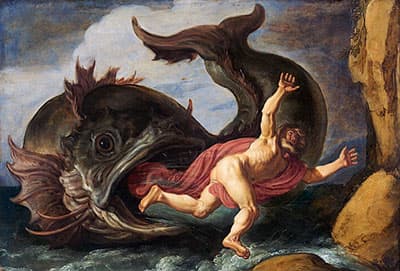The Book of Jonah
 The Old Testament, KJV
The Old Testament, KJVAlso known as
Jonah and the Whale; Jonah and the Big Fish
First publication
c.400 BCE
Literature form
Story
Genres
Mythology
Writing language
Hebrew
Author's country
Israel
Length
Approx. 1,300 words (King James version)
The man who survived the deep
The story of Jonah surviving in the belly of a whale—or a big fish, to be exact—is one of those tales that everyone in the Judeo-Christian or Islamic world has heard, whether or not they are religious. It's one of the most popular stories that everyone knows from The Hebrew Bible or Old Testament, along with:
• Adam and Eve in the Garden of Eden,
• Noah's Ark and the flood
• Moses parting the Red Sea
• David and Goliath
• Daniel in the lions' den
And perhaps several more you can pick out from the volume's text.
But "Jonah and the Whale", as the story is often referred to, is different from the others.
It's the Bible story that sounds most like a fun adventure tale—at least part of it does. "Hey, kids, did you hear about the guy who got caught in a storm at sea, was thrown overboard, got swallowed by a whale—and escaped?!" Storybooks abound.
So many of the old biblical stories illustrate the theme of God's people disobeying and being punished, or God's people obeying and being rewarded, and there is quite a bit of that in the Jonah story too. But the Jonah story is unique in several other ways.
The tale stands in a book of its own in the Christian canon, unlike most of the other Sunday School-friendly stories that have to excavated from the dense theological, genealogical, and historical detail filling the Old Testament. In the Jewish tradition Jonah's story is placed in a long book, known as Nevi'im, with the prophecies of other so-called minor prophets of the Hebrew Bible ("minor" because their books are relatively short). In the Islamic tradition Jonah is called "The One with the Fish" and the only one of the twelve minor prophets to have a place in the Quran.
"The Book of Jonah" is not a collection of prophecies like most accounts of the prophets. It's more of a narrative than other books of the Bible, spelled out in forty-six verses of storyline without a lot of extraneous detail. Even religious scholars consider the account fictional.
The story also features a seriously flawed protagonist, which makes him more interesting than run-of-the-mill Biblical prophets. While most Old Testament heroes are stalwart and righteous in braving dangers to obey their god, Jonah evades his God-given mission and, eventually driven to perform it, he sulks mightily.
More like a fable
"The Book of Jonah" is also a more creative literary piece than its surrounding books. As a story it's less plausible than much of the Bible, obviously exaggerated and almost silly at times.
This may sound like an odd statement, given that the Bible is replete with supernatural beings, miraculous healings, incredible feats and bizarre apocalyptic predictions. But there's still something more than usually fabulous about a man who lives inside a sea creature and is coughed up to warn people of impending doom. Many of the details of the story are inconsistent or just nonsensical if you think about them for any length of time, though the unknown authors of "Jonah and the Whale" were not really going for realism. At times the story reads more like an Aesop fable or a fairy tale than a religious lesson.
With a few tweaks, the story could easily be imagined as a tale of ancient Greek mythology. The divine being in the Jonah tale is portrayed closer in type to an imperfect Olympian god—fantastically powerful perhaps but petty, erratic and tricky. This has led some scholars to call the piece ironical, to claim it actually satirizes the idea of gods and prophecy.
This may also make you ponder the Book of Jonah's origins. Might the story have arisen from pagan sources and been reworked to graft it onto the body of religious writings that would become the Bible? It wouldn't be the first time. Many other "Bible" stories—most notably the Noah's Ark story—can be found in multiple variations predating the Old Testament. See Gilgamesh, also known as The Man Who Saw the Deep, for several such precursors.
The political context of the story is interesting too. When told to kids (and probably many adults) "Jonah and the Whale" is all about a prophet who disobeys God, is swallowed by a whale and stays alive until the mercy of God lets him get away. But the less familiar parts of The Book of Jonah make it more nuanced—and confuse the Sunday School message.
Jonah's God-given task is to leave Israel and go to Nineveh, in the north of today's Iraq, to "cry against it" for the city's wickedness. Which seems strange. The people of Nineveh could not be expected to worship the god of the Israelites. This story may have been incorporated into the Hebrew Bible to urge that God's salvation be extended beyond his supposedly chosen people to the rest of the world, a radical idea at the time and heralding the Christian movement to come.
When Jonah finally does carry out the task, the Ninevites almost immediately heed his words and, led by their king, repent their evil ways—to a ridiculous extent, even dressing their livestock in sackcloth—and God's punishment is averted. As if the narrator is saying, "See how easy it is. See how powerful Yahweh's message is if we take it abroad?"
Parallels to Christ
The book ends with a truncated parable. Oddly, Jonah is actually peeved at the wild success of his mission, possibly because he abhors the idea of Gentiles being saved. God admonishes him by drawing a comparison between Jonah's care for a shade-giving gourd with God's concern for the well-being of the Ninevites whom he also supposedly created.
A bit of a metaphorical stretch, for sure. It appears added on, ending "The Book of Jonah" abruptly, indicating someone thought the point needed underlining at a time when Jewish religious exclusivity was the norm. God cares for everyone, not just the Jews, this piece argues.
This tolerant message holds a minority position in the Old Testament, which is otherwise imbued with Jewish nationalism. The New Testament gospels are closer to a 50-50 split on preaching to the Gentiles, with later writings in that volume growing increasingly internationalist.
Of course there are many other interpretations of this unusual story in the Old Testament, especially from religious writers who go to great lengths to smooth out any contradictions and make it compatible with the rest of the Bible—perhaps continuing the efforts of those who reworked the Jonah story in the first place.
Some critics also point out parallels between this story in the Old Testament and the resurrection stories of the New Testament, positing Jonah as the original of a "type" replicated by Jesus. They are helped by Christ's own purported words in The Book of Matthew: "For as Jonas was three days and three nights in the whale's belly; so shall the Son of man be three days and three nights in the heart of the earth."
While interesting, these arguments may be of little relevance to the consideration of "Jonah and the Whale" as a standalone literary work. As such, it may not rank quite as high as other myths of ancient times, but it is stranger, more intriguing and more psychologically complex than most other tales of the ancient anthology in which it is situated.
— Eric


